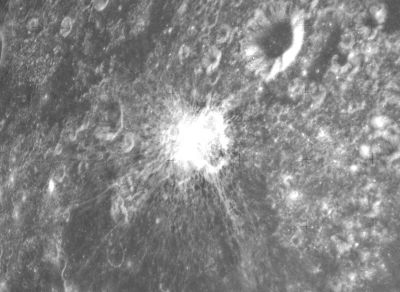Petit
Contents
Petit
(formerly Apollonius W)
|
Lat: 2.3°N, Long: 63.5°E, Diam: 5 km, Depth: 1.07 km, Rükl 38, Copernican |

AS17-M-2382 Petit is the crater surrounded by bright ejecta in the center of this frame, the fluted crater to its upper right is Townley. North is roughly to the right in this view.
Images
LPOD Photo Gallery Lunar Orbiter Images Apollo Images
- Lunar Orbiter 1 frame 1029 (med) shows Apollonius W (Petit) near the photograph's right margin.
- Apollo 10's color-Hasselblad frames AS10-34-5128, 5129, and 5130 show oblique close ups of Petit and its system of rays.
- Raycrater Petit and its bright ejectablanket were also captured on Apollo 16's oblique northward-looking orbital ITEK-panoramic frames AS16-P-5168 and AS16-P-5173. On both frames, bright Petit is located near the right margin, with dark-floored Townley rightward of it.
- Apollo 17's orbital ITEK-panoramic frames AS17-P-2907 and AS17-P-2912 show wonderful near-vertical close ups of Petit and its high-albedo inner slopes (scroll to the centre of both frames, can't miss Petit!).
- The coordinates mentioned below Apollo 10's Hasselblad photograph AS10-33-4895 are totally wrong. This photograph shows Petit, which is NOT located south of the moon's equator!
- Apollo 10's Hasselblads AS10-29-4244 and 4245 also show oblique looks at Petit and its system of rays (it's certainly not Mare Crisium, as mentioned in the captions of both frames).
- Research Lunar Orbiter 1, Apollo 10, Apollo 16, and Apollo 17 photography: Danny Caes
Maps
(LAC zone 62C4) USGS Digital Atlas PDF LAC map Geologic map LM map LTO map
Description
A small, fresh bowl-shaped crater just outside the rim of a much larger (12x16 km), but unnamed, elliptically-shaped crater of similar depth to its northeast. Petit is covered by bright ejecta which produce a small ray system extending onto the floor of nearby Mare Spumans. It is very bright at high sun angles. Petit may be the result of an oblique impact. - Jim Mosher
Description: Elger
Among the hills S. of Apollonius, there is a small bright streak system. (probable reference to ejecta around Petit)
Description: Wikipedia
Additional Information
- Depth data from Kurt Fisher database
- Westfall, 2000: 1.07 km
- the depth indicated on LTO 62C4 is 0.97 km. - Jim Mosher
Nomenclature
- Alexis Thérèse Petit (October 2, 1791 - June 21, 1820) was a French physicist. Petit is known for his work on the efficiencies of air- and steam-engines, published in 1818.
- The present name was introduced on LTO 62C4 (published in August, 1974) and approved by the IAU in 1976. The former name, Apollonius W, could not be used on the LTO because the IAU had banned the use of lettered names on lunar maps in 1973.
- Perhaps we could also add Frederic Petit (1810-1865, French astronomer) who discovered "a second moon of Earth" in 1846.
- Not to be confused with Pettit
LPOD Articles
Petit Spectacular
Four with one shot (Howard Eskildsen's Concentric Craters, plus Petit).
Bibliography
A Portfolio of Lunar Drawings (Harold Hill), page 25 (Mare Spumans).